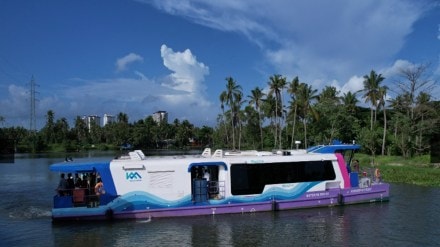Prime Minister Narendra Modi is set to dedicate the Kochi Water Metro service to the nation next week. The inaugural event will take place on April 25, 2023 at Thiruvananthapuram. This new project will boost the economic growth as well as tourism in the Kochi region.
The Kochi Water Metro has been built at a cost of Rs 1,136.83 crore in the port city. Kerala Chief Minister Pinarayi Vijayan has termed it as a “dream project” of the state. In a tweet, the Chief Minister said that exciting times are ahead for the southern state’s transport and tourism sectors.
“The world-class #KochiWaterMetro is setting sail! It is Kerala’s dream project connecting 10 islands in and around Kochi. KWM with 78 electric boats & 38 terminals cost 1,136.83 crores, funded by GoK & KfW,” Vijayan tweeted.
Kochi is one of the most densely populated districts in Kerala and thereby the new mode of transport has been envisaged to reduce traffic congestion and also ease access along the Kochi lakeshore.
For seamless connectivity, the project will connect 10 islands around the city through battery-operated electric hybrid boats. The water metro project has identified the development of 15 routes along a network of routes that span 78 km. The project will be modern, energy efficient, environment friendly, and enhance the passenger experience.
How to travel in Kochi Water Metro:-
As a first phase of the project, the service will begin from High Court-Vypin terminals to Vyttila-Kakkanad terminals soon. The commuters can travel in both Kochi Metro and Water Metro using the “Kochi 1” card. One can also book the tickets digitally.
Significance:-
The Kochi Water Metro project will benefit more than one lakh islanders. The project will improve the livelihoods through commercial property development and tourism-based initiatives.
